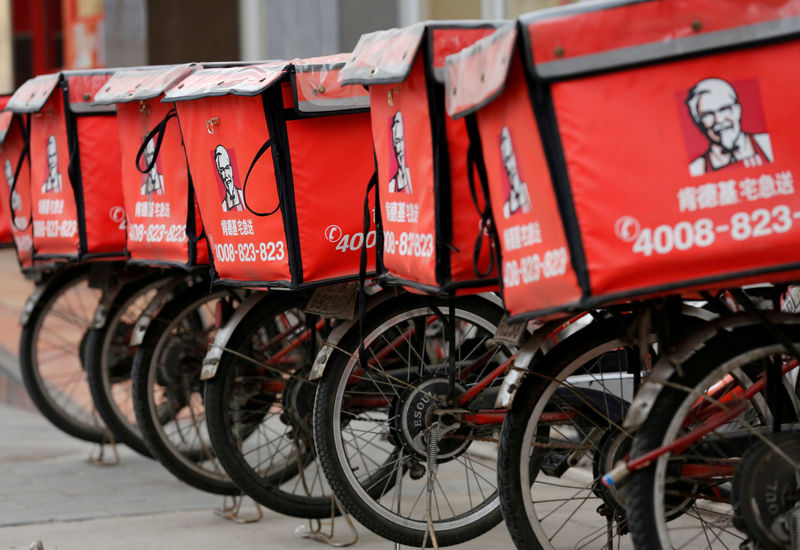By Tom Polansek and Lisa Baertlein
CHICAGO/LOS ANGELES (Reuters) - To meet increasing demand for meat raised without certain antibiotics, top U.S. chicken company Tyson Foods Inc (N:TSN) and rival producers are turning to sanitizing wipes, bacteria-reducing fog and even oregano to keep birds healthy.
Some have spent years of trial and error on new techniques to figure out replacements for human drugs, part of a fight against the rise of dangerous antibiotic-resistant bacteria in people.
Yum Brands Inc's (N:YUM) KFC on Friday became the last of the big three U.S. chicken restaurants to move away from antibiotics important to human medicine. McDonald's Corp (N:MCD) and privately held Chick-fil-A had already made similar commitments.
Nationwide, more than 42 percent of the U.S. chicken industry has already committed to reducing the use of antibiotics, according to the Natural Resources Defense Council. With KFC's move, that number is set to grow.
KFC U.S. President Kevin Hochman called the chain's move a "major milestone" that should significantly increase the supply of bone-in chicken raised without medically important antibiotics. It should also open the door for smaller chains to follow KFC's move, he told Reuters.
KFC, which sells more than 65 million buckets of chicken a year, estimated that one-third of its suppliers were already transitioning to chicken raised with fewer antibiotics.
The company said it was late to shift away from human antibiotics because it had to persuade suppliers of bone-in chickens it uses to make the change.
The chain typically only buys up to one-third of birds in a flock because the others do not meet its specifications. That meant its suppliers needed to find other buyers before being able to curb use of the drugs to satisfy KFC, the company said.
The suppliers have improved hygiene and airflow in chicken houses to keep birds healthy and given them more room to move, Vijay Sukumar, chief food innovation officer for KFC's U.S. operations, told Reuters on Friday. That has raised costs but also reduced the need for drugs, he said. He did not give further details of the costs.
"We had to convince our suppliers to go for the change and then they worked with us," Sukumar said.
HERBS AND HYGIENE
Tyson, one of KFC's suppliers, set a goal in April 2015 to eliminate the use of human antibiotics from its broiler flocks, or those raised for meat, by the end of September 2017.
More than 90 percent of broiler chickens in its supply chain were raised without antibiotics also used in humans in its fiscal year 2016, Tyson told Reuters on Friday.
The company also plans to switch its retail line of Tyson-branded chicken products to birds raised without any antibiotics.
Perdue Farms, a competitor, said it eliminated the routine use of all antibiotics in chicken last year. It now puts oregano in birds' water, banking on the herb's antioxidants to keep them healthy, and takes other steps to avoid drugs.
Tyson said it has ramped up efforts to sanitize facilities and eggs that hatch into baby chicks, which are most vulnerable to sickness.
The company wanted eggs to be cleaner before they hatch and now asks farmers to rub them with sanitizing wipes before shipping them to a Tyson facility, said Bill Hewat, Tyson's director of international veterinarian services, during a tour of a Missouri hatchery last year.
Once the eggs arrive, Tyson places them in a room filled nightly with a fog of peracetic acid that is intended to keep the bacterial load as low as possible before eggs go into incubators, he said.
"It's an incubator for eggs," said Hewat. "Unfortunately it's also an incubator for bacteria."
The mortality rate for Tyson's chicks in their first week of life increased after the company initially removed human antibiotics, Hewat said. By September 2016, it had returned to close to where it was before the change, because of Tyson's extra efforts, he said.
Tyson has also started spraying hot water inside the hatchery to maintain a clean environment and increased spot-testing for bacteria.
"We wanted hospital-clean," said Kevin Gibbs, a production manager.
Tyson has found it difficult to explain to some farmers why the company wants to change its practices to shift away from antibiotics, according to Alan Johnston, a manager at the Tyson facilities in Missouri.
"It's like turning the Titanic on some of these things," he said.
